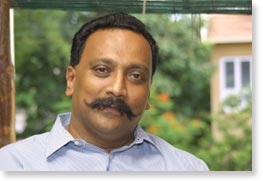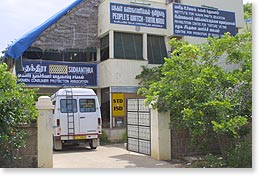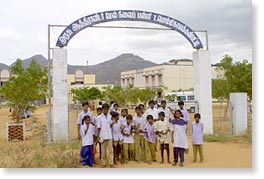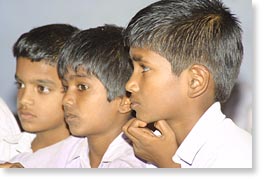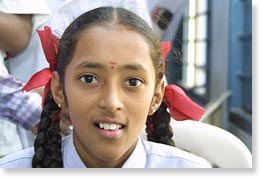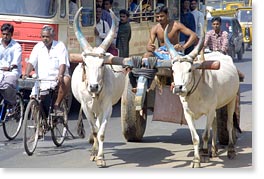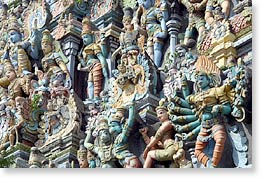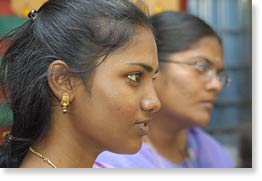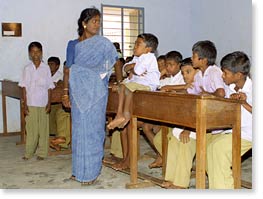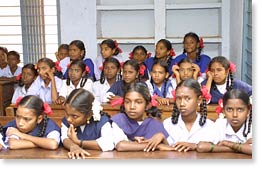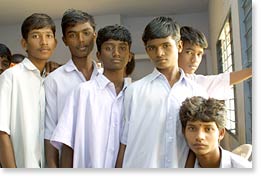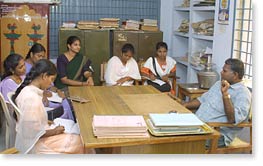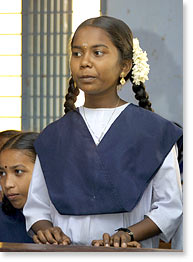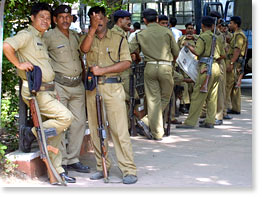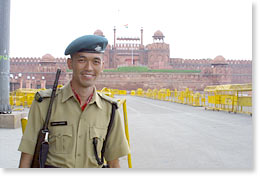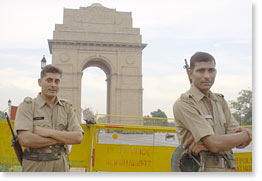|
Interview with Henri Tiphagne
of People's Watch -Tamil Nadu Human Rights Organizations: Protective and Promotive Monitoring the state -- Educating in the schools Madurai, Tamil Nadu, India
People's Union for Civil Liberties In Motion Magazine: Why did you personally become involved in issues of human rights and, particularly, in torture in Tamil Nadu.? Henri Tiphagne: Human rights has become a very passionate issue to me since, in 1977 until '80, I was privileged to have an opportunity of working at the grassroots in a program which started as a development project immediately after a natural calamity, after a flood, in the then combined district of Madurai (now Madurai and Dindigul ) of Tamil Nadu. While we were there, engaged in this development project, we were also engaged in organizing people. And this task of organizing people, especially when we were in need of legal assistance and the difficulty of being able to get lawyers willing to take the cases of the poor in this country led me to reflect that "I need to do my law" because law was very much useful when you are working with people and people's issues. That pushed me into doing my law. In those days, law college was not considered a very serious course, so the discipline on the campus also was not very serious and for me it was very difficult to fit into that kind of a culture of a college, where you didn't have discipline at all. Therefore I preferred to stay outside the law college campus. I had to engage myself outside the law college campus and my engagements then became in the area of civil liberties and human rights. In 1979/80 I started civil liberties work as a student activist and later become the secretary of the Madurai unit of the People's Union for Civil Liberties and took up a lot of activities here. Later, I became the general secretary of the Tamil Nadu unit and I also served on the national council of the PUCL as well as its National Organizing Secretary. Always the state which used to escape However, the People's Union for Civil Liberties is an organization that works with persons who give their time free and who donate to the organization. It does not receive any resources from any quarters. Therefore, over the years, I came to realize through lots of issues that we were handling that it was always the state which used to escape. Because the state would always know, "OK, Henri has an issue at hand. OK, this issue can keep him busy for some time." And before I'm able to find some solution to this issue there are two other issues that come up. "Am I going to be bothered about my professional engagements in the morning?" "Am I going to be bothered about my human rights engagements which are voluntary?" So I am not able to give that quality time and quality attention to the issue as I normally would like to. I found that every time the issue was always stopped in between and the state always knew, "The maximum damage that these people can do is to make noise for two days." "They will definitely make a lot of noise and it will carry them two days. If we are able to tie it over those two days, or three days or one week, then they have too many issues at hand so they will definitely jump on to the next issue. This issue will be forgotten for them." This was the feeling we used to get. It was a very frustrated feeling we used to develop with them. In this background, I was provided an opportunity to be in Vienna in 1993. Much against my will I went to Vienna. I didn't realize, at that point of time, that there was going to be any gain in going to Vienna to attend the Second World Conference on Human Rights. I had never been to a world conference on human rights. I had not known what a world conference was. I didn't know what international human rights mechanisms were in reality and what they could do to us at the grass roots. I was a young civil liberties lawyer t who was working on the rights arena. But then came this World Conference on Human Rights and I was a lawyer. I was making sufficient money and it was what I was engaged in. Although I was doing a lot of pro bono work, I was also making sufficient money at that time. It was because the invitation came from a very close friend of mine that I had to say "Yes" to the invitation. And I did say "Yes" to the invitation. When I went there I saw a complete different reality. I, for the first time, was able to see how human rights could be put to practice. The very, very special learning, and I always keep this very close to my heart, I share it with all my colleagues here, was to see in practice that human rights organizations could monitor the state. And could hold the state accountable for its faults. I was able to see mechanisms by which these organizations were able to do this and also contribute to different changes that were possible. So, I came back with this lesson and I said, "My goodness me, we cannot continue like this with this ordinary, voluntary type of work that we are engaged in. Human rights needs a professional response." Myself, in my capacities as a professional lawyer, has to go full time into human rights if those desires are to come up. And there are ways of doing it through human rights organizations. I came back here and I personally met a number of organizations which are engaged in human rights to try to convince them. Everybody tells me, "It is a wonderful idea but it is a very tough idea." "Monitoring human rights is not an easy task. Monitoring human rights is rubbing the state on the wrong side." "We have all been doing lovely work for children, for women, for handicapped, for all these sections, and all that will come to a still if we were to get engaged in this process." The usual solution is whenever there is something not very encouraging for the other people, they tell you, "You start it and we will stand in support with you." I can name one, two, three, four organizations and all of them unanimously said, "We will stand with you if you start something new." So believe me that was the reason which pushed a few of us. I came back and naturally there was a group with which we share here -- for example Dr. Devasahayam and Rev.Fr. Diamond Raj -- and they all knew that this excitement was reasonable. They also knew that all what I was talking about other human rights organizations not coming forward was also true. So this Fr. Diamond Raj, whose photo you saw, said, "I'm willing to spend my time doing administration work and allow you the space to do work on human rights monitoring " So that is how People's Watch started in '95. So, the '93 Vienna conference and coming back, putting all this together. Putting a group of people together whose names you see in our Program Advisory Board, though one or two of them might have changed in time. We shared with them. We sat with them and we finalized our objectives of the program which you see right there. We started off in December 1995. This is the background. Monitoring the state to make it accountable for the violations it is generating was the sole centrality around which this whole experiment started. This was the lesson I learned from Vienna. In Motion Magazine: What were the primary stepping stones in People's Watch's development? Henri Tiphagne: Well, monitoring was the first stone that we engaged ourselves in. And when I say we engaged ourselves in monitoring, the truth is we started understanding for ourselves what human rights monitoring was. Tamil Nadu in those days, 1995, 1996 was not a calm Tamil Nadu. It is not what it is today. The entire south was burning. Caste clashes were at their peak in '95, '96, '97 and we jump in here like big messiahs and say, "We are going to start human rights monitoring work." It was a very, very tough business to engage in because you are putting yourself in a situation where you don't have time to look at something peaceful because everything around you is burning, boiling. One of the mandates to us by our board members, who in those days were actually all these visionaries, co-visionaries, was, "Keep away from courts. You are all lawyers. You have been dabbling too much with courts. Now dabble a little bit in the field without getting caught up with courts." We were not supposed to take matters to courts in this initial stage of trying to see how the human rights monitoring work continues, trying to understand what fact-finding really means. Trying to find out what confronting the state at the grassroots mean. The initial stage was a stage where we learnt a lot. More than what we contributed. People say we contributed a lot in terms of highlighting the caste clashes in Tamil Nadu at that time, but my real opinion would be that we learnt a lot in the first one and a half years. Tremendously learning. And most of those who came here - we were about 18 who started off, 14 of them are still in the program -- we have each stepped into different arenas. Beyond monitoring - interventions What started as human rights monitoring work in 1995 gradually grew into a realization after two years that you just cannot keep monitoring and generating reports. Victims want responses. Victims want justice. So that pushed us onto interventions -- interventions in local courts, interventions in national human rights institutions, at the state level, and at the national level. And gradually, as we were learning, interventions, also, in international human rights mechanisms. There we started our journey of interventions. The team bifurcated and said, "There will be a monitoring team and there will be an intervention team." And, as this journey progressed, in about 1998 as the cases multiplied, some of the victims in cases also made us realize, and realize under very, very serious circumstances, human rights work also means that you have to be sensitive to victims. You cannot go on always talking about people in terms of their being "complainants", and they being "accused", and they being "witnesses", and whether the "complaint has been filed" before the court, the commissions, the U.N. (United Nations), and all that. They are human beings there: who has lost his life; or who has lost a member in the family; or doesn't have a hand; who doesn't have a leg; who has been tortured; who is traumatized. We started realizing that there is the whole person we have forgotten. I started realizing, I'm not talking "we", I started realizing. And this started with one victim. The victim is not around here today but usually she is around for some reason or the other. A victim of torture. She would come every two weeks and tell us she lost her husband. Her husband was killed in custody. And she was raped in custody in front of the husband being hanged, beaten, buttocks peeled off, a hole in the tongue, the nails had been pierced into. All sorts of … . You can go on narrating nasty things about this whole situation. And he finally died. This lady, 'til long time thereafter, always used to come back to us and say, "I have a chest pain." "I have a headache." "I have back pain." "The whole body is paining." "I'm feeling like my head is reeling." So what is this? We do so much for this lady and she always comes back with complaints. We sent her to a gynecologist. We sent her to a heart specialist. We sent her to a general physician. Everybody comes back and laughs and says, "Henri, this lady will always be a patient. You don't understand what has happened to this lady. This lady has been traumatized because of what she has heard, what she has seen, what she has undergone. And therefore this lady needs counseling. You have to engage yourself in certain other things. The health of this lady is perfect, but she is always imperfect." It took us a long time, frankly speaking, to understand. All these are very special doctors here. "OK, I don't trust this doctor." So I sent her to another doctor and this doctor said the same thing. Really, all the doctors are telling us the same thing. It is we who are the fools. Not the doctors. Not the lady. That way it was realized that as much as we are concerned about victims, and their cases, and justice, and standards, and courts, and laws, and conventions, and declarations we have also to be bothered about themselves, their psychological health, their person, and the fact that they could also be traumatized. Rehabilitation for torture victims This has over a period of time now become a lesson that everybody here has learned. All of us have gone through that lesson and that stripped off to the third stage of our work, which happened to be something that we call the Rehabilitation Center for Torture Victims. So that there would be a place where our victims of torture could come and stay. If a person goes for monitoring today, while he talks to the victim he is conscious that he has to win over this victim, create boldness, encourage this victim, because for us that victim is not important for the report that the victim is contributing to, that victim is going to be a part of a larger process of strengthening that victim, and if the victim has been traumatized then putting that victim back to normality, etc. So, that was the third stage of our development - monitoring, intervention, and rehabilitation. Of course, all this has to reach a wider section of society within Tamil Nadu, therefore we initially participated in a number of campaigns and later we started a few campaigns in unique areas which others may not engage themselves - one being torture. From monitoring we went to intervention. From intervention we went to rehabilitation. From rehabilitation we have gone into campaigns. But all that we hold together as one integral part of our work.
Very passionately we used to conduct training programs. I remember the first was August 1996, nine months after we got established. We worked for about two months preparing for that training program. We said, "We will have an intervention training program so that we can recruit people. And then we will multiply ourselves throughout the state and then we will have 200, 300 people. And they will all do monitoring." The training program was very good. A lot of people came. We learned a lot of things through the training programs. But when the fact-finding actually took place everybody had a reason why they should not go to that place on that particular day! Each reason used to be very genuine. We found that the actual fact findings did not take place. And that put us into the whole culture of looking at training programs. All our training programs in those days used to be with lawyers, with NGOs (Non-Governmental Organizations), with movement leaders, aimed at recruiting people for continuing the monitoring agenda forward. But, while we were on that journey of doing training programs, some women school teachers came forward, who were participants to a training program and said, "Please help us in our schools. There is a lot that we could do in our schools. We don't have time to do all the things that you have shared with us in this training because from morning to evening we are in schools with children. But if you can show us a way of how we can work within schools, then we would be willing to do that." That pushed us on, in 1995, to this whole process of engagement in human rights education, as you will see. We thus started our program of human rights education in schools more as a small experiment, a small experiment in '97, '98, a slightly bigger experiment in '98 to 2000, a slightly bigger experiment in '99-2002, and landing up at the last stage that you have seen -- Phase 4 where you have all these kids. Therefore the second process that we got engaged in is human rights education for different sections. Schools is one you saw. Colleges is something else. Specialized courses for human rights, human rights courses for professionals -- lawyers, doctors, journalists, for elected representatives -- these are other areas that we do work with also. Basically, two major areas. One being the protective work that we do in human rights monitoring, and the other promotive work we do through human rights education. These are the two major arms of our work and in between you have the documentation center and publications which contribute on both sides to both these arms. Abuse issue: Caste discrimination In Motion Magazine: Could you speak some more about abuses you monitor? Henri Tiphagne: In terms of abuses, historically what received out attention first was the issue of caste discrimination. Largely so, not because of our planning, and on that I want to be honest, because there are many people who come and appreciate us and say, "Very good, you took up a very good issue, internationally," and this and that. But we shouldn't forget that Tamil Nadu was burning with caste riots those days in the years 1995, '96, '97. We couldn't have claimed to be doing human rights work if we did not engage ourselves in those issues of caste discrimination around us. In Motion Magazine: When you say burning - you mean literally burning? Henri Tiphagne: Literally burning. People were being killed, murdered, and not one or two. Every incident used to be 10 people killed at this side, ten people killed from that side. It was continuously like this. So caste discrimination became one major area of concentration for us and from then 'til today we have never looked the other way because that engaged us inside different levels. Our engagement in issues of caste discrimination led us to start communicating these issues of discrimination to international human rights organizations, though on the one hand we were well convinced that within the human rights scenario, international human rights organizations and the U.N. had kept themselves totally unconnected with issues of caste discrimination. We made simultaneous efforts with Amnesty International as well as Human Rights Watch -- but it so happened that Human Rights Watch responded much faster and created gradually a mandate for themselves on these issues .This whole engagement from here with Human Rights Watch resulted in their subsequent research in India on caste discrimination covering three states, one of which happened to be Tamil Nadu. The result of which has been their (report) titled "Broken People". That was as a result of their work here and all that many of us had contributed as well in the field. "Broken People" has a very interesting origin. "Broken People", one could boldly state, laid the foundation for the discussions which started what then came to be later known as a National Campaign on Dalit Human Rights in the country, a national-level campaign that was initiated in the country in 1998 to coincide with the 50th year of our independence and the 50th anniversary of the Universal Declaration of Human Rights, and to show that 50 years of independence in India and 50 years of the Universal Declaration of Human Rights of the U.N. had not at any point of time made a dent within the issue of caste discrimination, something which effects more than 260 million people in the world. Later the National Campaign for Dalit Human Rights led, in 2000, to the formation of the International Dalit Solidarity Network, which is now a network which brings together a number of international human rights organizations, donor agencies, as well as national networks, all working towards solidarity actions, advocacy and lobbying globally around the issue of caste discrimination. In 2000, this then forced us to intervene within the Sub Commission on Human Rights in the U.N. So much so that in 2000 August we got the first resolution of the United Nations Sub Commission on Human Rights which wanted to study caste discrimination. That had never taken place till then. So, one major area of concentration for us has been caste discrimination. With our Dalit Human Rights Monitoring Project we are taking to twelve states our learning from here (Tamilnadu) of human rights monitoring. We are just taking all these lessons learnt, trying to package them together. All what we did not do here properly we are now telling others to do in disparate states. Basically trying to see that this country needs a lot of documentation of violations done in a more systematic and professional manner. And therefore this program. So, in terms of issues, caste discrimination is one. Abuse issue: Custodial violence - encounter death The second issue, which has equally received our attention, has been the issue of custodial violence. I can subdivide it into three different issues. One being the custodial violence leading to what is popularly known in this part of the world as "encounter deaths". An encounter death is a death where the police kill somebody and dispose of the body. They say there was a clash between two groups of people and it is always the non-policeman who gets killed. The policeman will have a small scratch here and there. But the story would be that, "You were attempting to throw a bomb at me" or "fire at me bullets." and this and that. "In self-defense I attacked and as a result of which you die." "I" will never die. In an encounter death the policeman never dies. The policeman always sustains serious injuries which land him to be forcibly kept in a hospital for one or two days. So, this is something that interested us. This family that you see here, this was an attempt to "encounter." The fellow who went to conduct the encounter was not trained properly so with one bullet to the head he just walked off. They thought one bullet would do the job. Perhaps they are not trained properly. So the fellow survived and now it's going to be the pain of their lives, facing this in terms of all that will follow. Custodial violence -- death in custody The second is custodial deaths that take place in custody. In a police station you beat a person brutally and this leads to their death in police stations. That's custodial deaths. And the third has been the question of torture. These are largely issues that we get engaged in, but it doesn't mean you don't have disappearances here. It doesn't mean you don't have other forms of violence. It only says that these are three categories of violations that we engage ourselves in here. The third part, torture, has been an area which we have been able to take a little more effort because we find that you really need to build a larger movement against torture. Torture cannot be only highlighting events and then blaming the police. It has to be aimed at creating a general culture among people to oppose torture. People have to, by and large, from different sections in society, tell publicly and create a public opinion that we will not tolerate the law enforcement officials taking law into their hands and subjecting people to torture. So that has taken the form of a special campaign as well. Abuse issue: Violence against women The third (general abuse) issue might be issues of violence against women which for a long time we have not been able to take up the way we would have liked to take up for various reasons. But on a smaller scale violence against women is something that we are actually engaged in. Besides this we, of course, also respond to child torture. We respond to environment issues. We respond to communal tension (arising out of religious fundamentalism ) issues as well. In Motion Magazine: Can you attach some numbers to how many people are effected by these various issues? Henri Tiphagne: Within Tamil Nadu we are now churning out about 45 fact-findings a month. In terms of our percentage of cases that we get, in terms of the 45 fact-findings a month, I could say that 70% would be custodial violence and the remaining 30% would be other forms of violence. Within that 70% of doing custodial violence, you will see that the number of people, of victims, will always be from the Dalit community -- who are considered the “untouchables”. (Such a terminology is used only to indicate to an international community what we mean. ) In Motion Magazine: What percentage of the population are the Dalits? Henri Tiphagne: Dalits in Tamil Nadu are 21% of the population. That is supposed to be considered one homogeneous community, but the “untouchables” also have three sub-castes in Tamilnadu –and this is also hierarchical! In Motion Magazine: What is your relationship with the police, the courts? Henri Tiphagne: Our relationship with the police is not bad, considering what it could be. It could have been worse. I always am happy that it is not as bad as it could be. Largely because we have over the years built some sort of linkage and network. And this is what I am coming to. If the work was such that it was centered around personalities here it would have been the easiest thing for the police to hide. But because the work is supported by a variety of people within and outside the state and the effort of People's Watch has been to try to link up with both state and national human rights institutions, and also internationally, with international human rights organizations, etc., the state finds it a little difficult to handle us the way they would love to handle us. For example, we will be extremely sharp in our criticisms, but always ensure that it is done with decency, politeness and respect of the individuals that we are dealing with. While fighting that chap who had done the mistake, we were always trying to simultaneously extend another hand of politeness and delicacy to the inspector because we try to separate them. This is our approach always, so that nobody is able to say that I, or anybody here in the organization, has anything personal against somebody. We cannot have anything personal against any single officer in the field of human rights – although we may be fighting a particular officer tooth and nail in a case. But we will fight you. If you have done something wrong we fight, while at the same time we will continue telling you that we don't have anything against you personally. This is a relationship which they find very difficult to understand. "This fellow is so rude" to them, in their terms, - in their terms we are supposed to be very rude to them - at the same time we are extremely polite, respectful and decent, we share with them a lot of things … but we don't give in. We never meet them one to one. I never meet a police officer one to one. The idea being that you don't get into personal deals. So, the chap is very embarrassed because he wants to meet you alone, because he thinks he can tell you a few things alone. And you always tell him -- and I am using “him” because it is always “him”, very rarely it is a “she” -- not that we have only problems with “him”s, we also have problems with “hers’ and “she”s -- you don't give them a chance. When an intelligence officer comes here, he always would love to be in this room alone. But I will make sure before he enters the room that there are other people in this room our position is that there is nothing confidential with any police officer or even an intelligence officer. I always make it clear to them that my staff and my colleagues here are my family here … there is nothing confidential that one could say to me in relation to my work, which I am not going to share with them. They are here because they have a stake in this whole work and my decision-making is along with them and definitely not alone. Human Rights work has to be collective as opposed to being carried out as small private initiatives related to one person alone. I think this has been largely the reason why we have not been handled the way they would like us to be handled. (Henri Tiphagne: This interview was taken in September 2003 and on the 5th of November 2003, the office of People’s Watch –Tamilnadu was raided by a team of about 70 policemen who had come armed with a search warrant -- in search of two alleged dacoits whom they believed strongly on the basis of evidence that we were “harbouring”. The matter is now a subject of a complaint before the National Human Rights Commission of India.) In Motion Magazine: And the courts? Henri Tiphagne: The courts. Not much because we don't use courts so much as of now. But I'm getting into the phase where I feel the judiciary needs a similar type of handling. The level of the judiciary is shaming to many of us who are supposed to be trained in using law. It is that poor in terms of honesty and uprightness and its inherent capacity to render justice when it involves the poor of our country. I therefore think the judiciary also needs to be finger-pointed. Human rights used to be a bad word But having said all this, Nic, I must say that you find things moving or changing for the good as well. The collective consciousness of people on human rights is slightly increasing. Human rights is a word which in 1980 used to be a bad word. When you said you were a human rights activist, it was almost like saying you are a terrorist today. In 1979, '80, I can tell you that was the meaning in Tamil Nadu – it only meant you were a ”naxalite” … . In Motion Magazine: Why? Henri Tiphagne: Well, human rights activists would then only take up matters of political prisoners. And who are these political prisoners? These political prisoners are very radical people in society. The logic used to flow from that. Naturally, you cannot have anything to do with a human rights activist therefore because, "This chap is only talking about these kind of very, very radical people" and how the state deals with them, etc., etc. But this has changed. Over the years it has become more popular. It has become so popular that you can go to a school where children talk to you in terms of human rights today as well and we have to be proud of that also. For me this is the change. Fortunately, I have personally been a part of the earlier phase of human rights and I am privileged to be involved at this phase of human rights and it is something which is beautiful to watch. So, I think things are moving. All these areas that we have addressed are areas of concern but they are not areas of concern that bring despair to us. These are areas of concern with a lot of hope in between. And the hope is not in our work. The hope is that there are a number of other people who are willing to come forward to do much better contributions to the promotion of human rights and protection of human rights. I think that is a hopeful scene. In Motion Magazine: What impact do you think you have had? Henri Tiphagne: In local communities, today, very definitely in the south of Tamil Nadu but also now slowly commencing in the northern portion of Tamil Nadu, we have been able to make political parties, larger mass movements, and trade unions be convinced that it is worth their time to spend their energy, focus and expertise on human rights. We have political parties who want to have discussions with us, movements who want trainings with us, because they really feel that human rights is worth their engagement. And this I think is very, very positive. Today with the NGO scenario it is not very easy that a mass organization, or a movement, or a political party will acknowledge the work of an NGO even at the cost or detriment of political organizations and yet they have come forward generously to say so -- on many occasions. In terms of communities, what we have found out is that communities are willing to back us. Communities are willing are to stand by us. Communities are willing to pay the cost and one best example would be this whole issue of the violations which have taken place at the behest of the Special Task Force who were attempting to catch the Sandalwood Smuggler Veerappan, where you had over 500 victims of human rights violations of a variety of nature and where today, with all the negative aspects that are arising there, we are looking at the question of rehabilitation with communities participating in it. In Motion Magazine: You were saying you are interactive with other organizations? Henri Tiphagne: We try to interact with other organizations. In Motion Magazine: How's that going? Henri Tiphagne: It is a slow process. Again it is not a hopeless process but it is a very slow process because human rights is too sensitive for them to get engaged. We are not talking about globalization here. We are not talking about something that is far away. We are talking about a functionary who can very easily come two minutes later before you and say, "What did you say?" And who possesses all powers in his hand. For the NGOs in the local area to come forward and say, "We will also stand with you on human rights issues" is a tough proposition. Because they are threatened. Their funding will be stopped. They will not be able to continue their level of work the way they are doing it. The question can be asked, "How about you?" We have survived so long, that's all. I can't even give assurance of another six months for us, while in all possibility there won't be any problem. But I'm saying there is nothing which gives you confidence to say, "Yes, yes, nothing can happen to us." Whereas, other NGOs can definitely say that. For example, we had an NGO Chief Functionary who started taking the rehabilitation program, who came here, spent the three, four days, spent his time, prepared a project. He went to his board and the board said, "No, no, no. Do anything but rehabilitation. Let us not get entangled on this." Prevention of Terrorism Ordinance Henri Tiphagne: Not only POTO but any preventive detention law is something that concerns us and has been concerning us right now from 1998, '99 onwards. Earlier, it was the Terrorist and Destructive Activities Act, which was known as TADA, which in 1995 was not extended, and therefore repealed. Thereafter, you had attempts by the government both at the state and the center to bring out preventive detention laws so that they could have shortcuts to prosecution, shortcuts to trial, and things of that sort. A lot of resistance was built with great difficulty by a number of NGOs, human rights organizations, political parties, movements etc. And in 1998, when a Bill was introduced by the State Government in Tamil Nadu, what was then known as POTO, we finally managed to get the whole thing withdrawn within one year in our State due to combined action. But after September 11 and the attack on our (Indian) Parliament, it was very difficult to prevent the government from doing what they wanted to do. Post-September 11 in India meant there was going to be another Prevention of Terrorism Ordinance but they were not able to get it passed through both houses of Parliament separately. Therefore, we had a joint sitting session of our Parliament and in January 2002, last year, we got the Prevention of Terrorism Bill passed. More than a thousand people are at the moment inside prison under this legislation in the country . In Tamil Nadu we have about 46 persons in jail. Some of them for over a year. Some of them for just uttering words. Almost each of these cases are cases of political vengeance by the functionaries of the state government. It has become very serious legislation which needs our attention. For example, I can be put under the Prevention of Terrorism Ordinance if only the local police decide to do so. And to make the local police decide to do so, it is only that they need to get one single phone call from Madras (Chennai) saying "Enough is enough with this chap." How will they do it? All that they would need is to ensure that they have some “arms and ammunitions “ put into this building. And how do they place arms and ammunitions into this building? I personally don't need to bring arms into this building. They would bring the arms into this building themselves … they will place it here themselves and then ensure that the arms are recovered .Then whatever case they make against me will become a case under the Prevention of Terrorism Act. That is enough to keep me in jail for a minimum of one year. The Act is not stopping violence In Motion Magazine: How do you analyze a situation where there are people blowing things up yet there's abuse. Henri Tiphagne: I will put the question the other way around. There is a Prevention of Terrorism Act and then you have the Bombay blasts as well (2003) (Editor: a week before this interview.) So the lesson is not that this kind of legislation is in any way a deterrent to people who are blowing things up. The act is not stopping violence. That is clear. Number two, our argument has been, and this has been the argument of the National Human Rights Commission of India, the legislations within the country are sufficient to handle the type of offences that take place hey are aimed at today. You also have certain other types of legislation which are already in place. You don't need a special POTO to be able to handle all these offenses. Now, it will be interesting if you make a study of the, I think, about five or six cases involving 50 people which are pending in Tamil Nadu. One case, which involves about eight of them, happened in this district by a Member of Parliament, a partner in the ruling alliance, who addressed a public meeting at night and during this long public address that he made, in a public meeting, for about one minute or less than minute, he quoted to the public what he had stated in Parliament earlier. And that was with reference to the LTTE (Liberation Tigers of Tamil Elam) in Sri Lanka. He made a reference to the LTTE in Sri Lanka, the Tamil Tigers. This was one and a half minutes repeating what he had stated in Parliament -- as he is a parliamentarian. He was not saying, "I support the LTTE". He only said, "When so-and-so Member of Parliament asked me something, this is the response I gave him in parliament. And I stand by that response." This has been interpreted to be an offense because LTTE is a banned organization!. He is alleged to be supporting a banned organization! In Motion Magazine: Just by mentioning their name? Henri Tiphagne: Yes. That's exactly what the offence against him is. And it is not only he. Forget him -- the fellow who asked for police permission for that public meeting; the person who paid the advance for the electricity for that public meeting; the person who booked the public address system for that meeting; the local party secretary - all eight of them are now in jail for one full year under the Prevention of Terrorism Act. And this is the “terrorism” people are talking about. You and I are concerned about a whole different form of terrorism. The other incident, and I am telling you the bare facts - 28 youngsters, all perhaps in their late teens or early twenties, maximum early twenties, owing allegiance to a particular political philosophy or left philosophy, tried to gather together in a very romantic manner in northern Tamil Nadu, sometime last year. I mean how foolish they were shows by what I am going to tell you. In the morning, at 9 a.m. in the morning, or 8:30 a.m. in the morning, it is not earlier than that, you cannot have people doing this -- they are all marching in a village. Now 25 or 26 of them don't know each other. They are just going for their political classes. They are marching ahead and while they are marching ahead with their sacks on their back going to whatever place they are going to - nobody knows what place they are going to, because there is only one person who knows where they are taking them -- the police come and they stop them. The police have some information about them. The whole village speaks about it. You march in the middle of the village and you march in the middle of the field - people say you are crazy. There is something wrong with you. The police say they got a tip-off like that. I think they got a tip-off earlier. "Stop them." And the one who was leading them was said to be armed and the police knew who he was. And according to the police version there was an “encounter” in which he died. The one who dies happened to be a person who had filed a writ petition before the Madras High Court regarding an earlier encounter in which the police killed one Ravindran in Dharmapuri district of Tamilnadu. Now all these 28 of them ran helter-skelter. Many of these 28 did not know one more person in that 28. It was a very interesting fact-finding for us because nobody in Tamil Nadu spoke. The very next day we rushed there. Our team went there. And this is north Tamil Nadu. Went there. Met everybody. Came to jail. Met people in jail and nobody could identify who anybody was. "Oh, he had a brown shirt, or this kind of a shirt, that kind of a shirt." It took a long time to identify. 28 people are charged under that case. I think there are five women. There were also two juveniles. Both were initially arrested because the police wanted their fathers … now their fathers are at home but the sons who are juveniles have been arrested. In Motion Magazine: What were they doing exactly? Henri Tiphagne: They were all going for this class, political class. And all that they needed was to be told, "You are foolish, don't do things this way. … You are proving yourself real idiots -- doing the things that you are doing. … Society does not work the way that you think it does…, etc., etc." Perhaps half of them would have learned the lesson with that. Now, you have put them in jail and you are getting hard-core dissidents to any normal civilian democratic life now after you put them in jail - at this age. Another eight (cases concern) very senior figures in Tamil Nadu. Some of them are mass movement leaders who have been at different points of time exposing the cause of Tamil nationalism here. Because Tamil nationalism here can easily be linked to LTTE, they have connected them in that capacity. Each with a separate affair. And they are also inside for one year. "First information report." They have registered a case against them and they are inside. Now, the type of violence, terrorism that you and I are looking at is not here. What is it that terrorism in India is about? They are two types of fundamentalist philosophies that are clashing - one being the Hindu fundamentalist, and the other being the Islamic fundamentalist. Both of which are taking proportions of terrorist acts on both sides. Now, nowhere in the country are these characters ever caught. Nowhere. Under the POTO. So POTO is in effect, in practice, but being used to the way many of us, as critics, told the government that it will be used. It will be used for petty party politics. For somebody in power to put somebody else behind bars. "It will not be used for that objective for which you are trying to bring it." Namely handling issues of terrorism, "You are giving extraordinary powers to the judiciary. You are giving extraordinary powers to the executive. And with this kind of a police, this extraordinary power is being handed over to them, definitely this is going to result in misuse." And that is what has happened. In Motion Magazine: Is there a relationship to George Bush's anti-terrorism campaign? Henri Tiphagne: Yes, of course. We (India) were the first to support the campaign and if misuse is here you also know about the misuse in the U.S. They were all very happy that George Bush was responding because they all wanted one reason to bring about this Prevention of Terrorism Ordinance. And they've got an opportunity to do so. To go one step further, many portions of our legislation is taken from the Patriot Act or the anti-terrorism legislation of U.K. Just chapters taken away. I can show you the anti-terrorism legislation of UK on this side and I can show you my legislation on here and say, "See from where this particular chapter has been lifted. It is lifted from there." That is the relationship. To that extent is the relationship. In Motion Magazine: Why do you think they are hooking up like this? Henri Tiphagne: This is part of a larger international scenario in the linkages that our country is entering into these days, particularly with this particular government, of very, very close international relationships with the U.S. We see it in the economic field. We also see it in the field of politics, particularly in the whole question of terrorism, anti-terrorism etc. Largely because whatever government is in power in India, in terms of governance, they've always used this Indo-Pak relationships as a basis. For us, in India, the worst enemy in the world, as perceived by ordinary people, is Pakistan. And this is the creation of our politicians. Even within my family, my daughter when she was in school used to come and say, "But this uncle from Pakistan is such a lovely person." The real meaning is that "Everybody Pakistani should be a criminal and this uncle is an exception" is what she was trying to tell us. Because that was the perception that was driven through our school teaching, through our public opinion creation, etc. etc. Therefore, for us, Indo-Pak relationships and anything that could help a government score one point more in terms of our relationships with Pakistan, is something that everybody is bothered about. Number one. Number two, you have a Hindutva government at the center, at the moment, with a very definite agenda. And it's a very dangerous agenda. It is not only a difficult agenda but a dangerous agenda of breaking this country and breaking the semblance of unity that already exists in this country. And for that agenda to move forward, of looking at everything in terms of whether you are a Hindu or you are a Muslim, or you are a minority, and things of that sort. It is that you are attacking an Islamic country and you know, "You Hindus have to come together to carry on this attack on an Islamic country." From various points of view, this relationship with the U.S. has played a very, very important role. And to mark all that off, this whole September 11 has crowned it – very unfortunately. All of us feel so bad about what has happened on September 11. But I think you have to see September 11 and what has taken place in terms of September 11 with the post-September 11 violence in different parts of the world, as well. (You have to see) what they have in fact contributed towards, and are contributing to today. These are progressions of a very serious nature touching about the fabric of our society -- trust in the United Nations, trust in any form of international governance today? We will have to see how all those things work. Globalization and human rights In Motion Magazine: Do you think there is a relationship between the globalizing effect of some of the multinational corporations and these attacks on human rights? Henri Tiphagne: Of course, I don't think we can see all these events in isolation. For us, within India, much of what we see in terms of policies and the effect of economic polices on poor people, particularly in terms of their socio-economic condition, has been a result of the globalization that we are subjected to. I do not know whether you had an opportunity to read about this, but the recent legislation in our state, which is known as the Tamil Nadu Essential Services Maintenance Act, is a legislation which is supposed to, in very popular terms, ban strikes. And the worst part is, and I don't think you have this example anywhere else in the world, in one day, overnight because of this legislation 3,00,000 government servants had been dismissed from service. Dismissed. I'm not saying suspended from service -- dismissed. In Motion Magazine: How did that happen? Henri Tiphagne: They passed an amendment to a piece of legislation. The legislation called Essential Services Maintenance Act existed, brought by this government a few months ago. But overnight, they brought in an amendment to an ordinance saying that if anybody defies the order and continues to be on strike then it is sufficient to dismiss that person … and that it was sufficient therefore that there is a public notice stuck in the office listing the number of people whom you have dismissed from service. That would be construed to serve sufficiently as service of notice on the person dismissed. In Motion Magazine:: What was the date? Henri Tiphagne: The second of July, 2003. In Motion Magazine: Three hundred thousand were fired? Henri Tiphagne: Were fired. Dismissed. In Motion Magazine: That seems like a major headline. Henri Tiphagne: It is a major headline and very sadly this has happened. The strike notice was for the second of July by government employees and teachers. The Secretarial staff in Chennai (Madras), which is the highest level of governance … these staff had some sort of protest on the first afternoon during their lunch break and decided that after lunch they wouldn't go back to work. So they struck work after lunch break. Almost all the offices were closed in the Tamilnadu Secretariate in Chennai therefore. The whole of July we had no governance at all, at all, at all, at all. Schools were not running. Offices were not running. Nothing. In Motion Magazine: Did they get their jobs back? Henri Tiphagne: I will tell you the story. They have got their jobs back except, now, 8,000 of them, and this is by going to the Supreme Court. And what is the condition of these 8,000? Just because they had "first information reports" (known as FIRs) against them, anybody who had an FIR against them, which is a criminal case registered by the police against them, that person was told, "You cannot be taken back." But that list happened to be a big list and the Supreme Court, through their intelligent use of discretion ! Has brought it down to 8,000. You should have seen that entire conversation, Nic, between the Supreme Court and the government … that took place in court . The Supreme Court was seen pleading to the government of Tamil Nadu to take these people back. I could never, never imagine this ever taking place … in a country that boasts of the Rule of Law being present. So now, 8,000 people have been told that a panel of judges is going to be appointed who is going to now, "Decide whether your dismissal was right or wrong." That dismissal process had no procedure. The procedure is now governed by an inquiry by three retired judges of the High Court, which has just started yesterday. What I am coming to say is, "Why this?" Why the urgency of a particular government to throw 300,000 people out on the street? The attempt was basically to throw a maximum number of people out of service to show that all this permanency that people had enjoyed in terms of various services, be they public services, teaching, government jobs, etc., are not going to be there. This is part of the larger design in terms of globalization that we are daring to follow. All the state governments now know it is the simplest thing to enact an Essential Services Maintenance Act and the moment somebody goes on strike, "Throw the fellow out". Nobody could dream this could ever happen. You talk about ILO (International Labor Organization) standards on right to work, right to collective bargaining, all these things -- all that has been thrown to the winds. And you have taken so many years for the international labor organizations and the trade unions to come to all these conventions and here you find one government destroying it off straight like this. All this is the effect of globalization for us. All this. Here you have a subsidized public food distribution system program. Overnight, we are told that anybody receiving more than five thousand rupees is going to be thrown out of the program - and we are all thrown out of the program. You find that all schemes which are now aimed at the poor which were state funded are one by one closing down. Very soon you will find schools, you will find health centers, all closing down and they will be handed over to some private actor, here or there, who will be asked to come and play. The anti-globalization call - it is no longer a sophisticated small group which is making the call. It is a popular view that is being held here. Mass movements are talking about it. And the fact that next year you are going to have the World Social Forum in Mumbai (Bombay) in India is enough proof of the popular opposition to globalization and now its outcome. But let's not forget that in the same society you have the other side of the scene. You have all the benefits of social globalization that people see within. And that is the problem. In this country where you have people who cannot have one meal a day, people who die out of hunger, you also have people who are earning 75,000 rupees, one lakh, two lakh a month after globalization. You see this disparity right here. You go into Madras, one part of Madras, and you see all these big multinational companies which have come there with all their staff and those who say, "We are earning 25,000 rupees and another says, "No, I'm earning 4K and 4.5K" and whatever K's they want to call it. They think it's demeaning to talk in terms of 20,000 not 50,000 and they say 5K and 6Ks and whatever. Their terminology itself is different. And this also takes place in the same little city in the same little state. You have the disparity. It is extremely glaring and that is what is making it very, very difficult. You have state governments which are now standing up to perform the mandated tasks that they are being asked to perform. And they are doing it wholeheartedly. In Motion Magazine: Do these corporations work more with the states than with the country as a whole? Henri Tiphagne: No. Both ways. Because of our federal nature, most of their policy-level intervention they do at the country level. But all their investment they do at the state level. There is a popular saying, and it is not a saying, it's also true, that the Chief Minister of Andhra Pradesh is really not bothered what the prime minister of India or the president of India gives, or that sort. He is more bothered about Bill Gates when he comes to Andhra Pradesh. What Bill Gates is investing. Who is bothered about the Prime Minister of India? There is no investment the Prime Minister of India is making in Andhra Pradesh. And it's a fact. Every state minister is now found visiting either E.U. countries or the U.S. and they are very serious trips. The Gujarat Chief Minister running to U.K. hurriedly for various reasons, and investments, and meetings. Each of them is engaged simultaneously in this whole process. They are all caught into the web. It is a country where you have the gains of globalization very visible in terms of all these Ks that people receive and all the external manifestations of that. And you have the extreme poverty on the other side. A visitor to India today who would have come ten years ago would say, "Oh, your national highways are really great. It's on par with some of our highways, etc., etc." But you take them to an interior-most village and then you will be able to see the disparity in that as well. It is very, very difficult. Realizing human rights - a resistance to the wrongs In Motion Magazine: How do you get human rights? Henri Tiphagne: The whole question of realizing rights for us is not a question of a campaign on human rights, or courts on human rights, or going through the laws in our country, or using all these delivering mechanisms that we have positively or negatively got our feelings about, but I think it is largely organizing people on issues which effect their daily lives. It is this question of bringing people together to reflect about issues that effect their daily lives in terms of their own values, their own economy, etc., which is going to build a resistance to the wrongs that are taking place. Unfortunately, that resistance is going to be very slow because of the opposition that is there. But it is in the process of this resistance that you are able to get some rights under you. On the one hand, we are losing a number of rights, which I just spoke about -- the right to collective bargaining is being just thrown overboard over night. But, at the same time, there are a number of rights which people are gaining and this gaining is more because of corrective speaking for, demanding for, a performance of rights scene. That is what is contributing, basically. That is what is contributing. It is not mechanisms and it is not laws. It is not things which are contributing. It is the collective consciousness of people to protest and move forward which has gained in strength. Published in In Motion Magazine April 4, 2004 Also see:
|
||||||||||||||||||||||||||||||||||||||||||||||||||||||||
If you have any thoughts on this or would like to contribute to an ongoing discussion in the  What is New? || Affirmative Action || Art Changes || Autonomy: Chiapas - California || Community Images || Education Rights || E-mail, Opinions and Discussion || En español || Essays from Ireland || Global Eyes || Healthcare || Human Rights/Civil Rights || Piri Thomas || Photo of the Week || QA: Interviews || Region || Rural America || Search || Donate || To be notified of new articles || Survey || In Motion Magazine's Store || In Motion Magazine Staff || In Unity Book of Photos || Links Around The World NPC Productions Copyright © 1995-2018 NPC Productions as a compilation. All Rights Reserved. |


